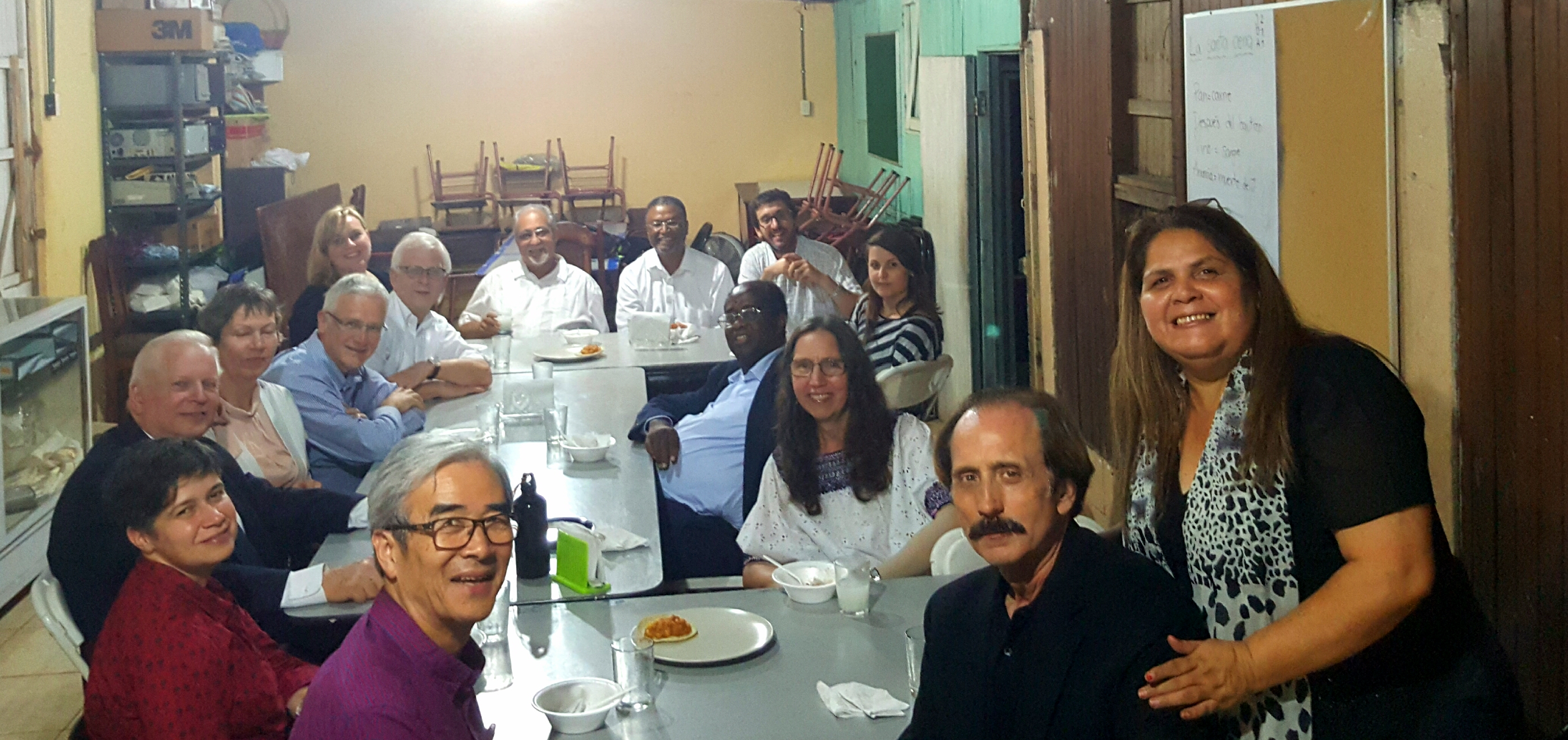Representatives of various classical Pentecostal churches and a delegation from the World Communion of Reformed Churches met at the Latin American Biblical University in San José, Costa Rica, 2-6 December 2016. This meeting was the third session of the third round which is focusing on mission.
Under the theme “Ministering to the Needs of the World: Mission and Pneumatology” papers from both perspectives were presented, by Dr. Wonsuk Ma (Pentecostal) and Dr. Nadia Marais (Reformed). The discussions were framed each morning and evening by a time of prayer, singing, Bible readings and devotional meditations. This was an integral part of the dialogue.
Dr. Marais built her presentation around the Nicene-Constantinopolitan creed’s statement on the Holy Spirit as the ‘Lord and Giver of Life’ affirmed by the first round of the Reformed-Pentecostal Dialogue. Related to this, she highlighted pneumatological impulses within the Reformed tradition and their implications for mission. First, it is not the Spirit alone, but the Spirit sent by the Father and the Son, who is active in mission. Second, Dr. Marais pointed out that the person and work of the Spirit is in relation to the person and work of the Son, “whose life, ministry and death provides the basis of the Spirit’s work, and with whom its relation takes logical priority when relating to the world”. Third, she emphasized the Spirit as the self-giving God, who is a gift given to the disciples and the church, and who also gives a variety of gifts to and within the community of faith, including most importantly, the gift of life. In an open-ended conclusion, Dr. Marais argued for the retrieval of the language of gift and gift-giving as complementary to the widely popular language of sending and being sent for speaking about the missionary or missional task of the church.
Dr. Ma spoke under the title “The Holy Spirit in Pentecostal Mission: A Look into the Shaping of Mission Awareness and Practice”. Missionary formation, he said, begins on a personal level because it is closely related to spiritual formation. Conversion as an encounter with God is key. This experience translates to one’s missional life. Being called by God and being empowered for ministry often goes hand in hand. Many Pentecostals consider a baptism of the Holy Spirit that translates into courage, receiving ordinary and/or extraordinary gifts as vital to missionary formation. Dr. Ma then focused on the role of the Holy Spirit in mission practice. The manifestation of “signs and wonders” in evangelism and establishing new congregations is understood to validate the biblical message of the good news in Jesus Christ. In conclusion, Dr. Ma stressed that such manifestations are always in the hands of a sovereign God. If they occur, they are to be understood as a sign of God’s grace.
During their meeting, the teams discussed each paper in plenary. The team then raised questions to one another. Thus, similarities and differences in the approaches could be further analyzed and refined.
The questions focused on the nature of the Holy Spirit’s work, its relation to the salvific work of Jesus Christ and the empowerment of believers ministering to a world in need. This dialogue was very fruitful and challenging because it helped the teams to appreciate the respective views on the Holy Spirit’s work in mission.
The delegates were welcomed to the campus of the Latin American Biblical University by its president Elisabeth Cook. A meeting with the governing board of the Costa Rican Evangelical Presbyterian Church, a member of the World Communion of Reformed Churches, provided a valuable opportunity for the dialogue partners to receive information about the life of the Reformed church in this country and how Pentecostalism is influencing the spirituality in many churches.
On Sunday, December 4, the participants joined in worship lead by Rev. Ledys Ruiz and Rev. Xinia Porras at New Guácima Presbyterian Church. In the evening the group took part in a service of the International Pentecostal Holiness Church of the Word in Santa Barbara, Heredia pastored by Rev. Ana Felicia Ulloa. Both congregations received the delegates with warmth and hospitality.
The Pentecostal team included: Rev. Dr. Cecil M. Robeck, co-chair (Assemblies of God, USA), Rt. Rev. Dr. David Daniels (Church of God in Christ, USA), Rev. Dr. Jacqueline Grey (Australian Christian Churches), Rev. Dr. Harold D. Hunter (International Pentecostal Holiness Church, USA), Rev. Dr. Wonsuk Ma (Assemblies of God, Korea) Dr. Jean-Daniel Plüss (Swiss Pentecostal Mission) and Dr. Olga Zaprometova (Church of God, Russia). Rev. Dr. Teresa Chai (Assemblies of God, Malaysia) was unable to attend this meeting. The Reformed team was composed of: Rev. Dr. Karla Koll, co-chair, (Presbyterian Church USA/Costa Rica), Rev. Dr. Carmelo Alvarez (Disciples of Christ, Puerto Rico/USA), Rev. Dr. Dario Barolin (Waldensian Church, Argentina), Rev. Dr. Nadia Marais (Dutch Reformed Church in South Africa), Rev. Dr. Setri Nyomi (Evangelical Presbyterian Church in Ghana), Rev. Dr. Bas Plaisier (Protestant Church in the Netherlands) and Rev. Dr. Gabriella Rácsok (Reformed Church of Hungary).
The next session of the Reformed-Pentecostal Dialogue is scheduled to take place November 30 – Dec. 6, 2017 in Sydney, Australia, where the focus will be on the relationship between mission and the church.
By Dr. Harold Hunter



